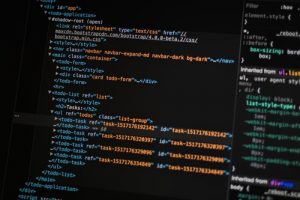NSWC Panama City hones maritime cyber hacking during virtual HACKtheMACHINE
By Katherine Mapp
To deliver more lethal, better-connected fleet capabilities, the U.S. Navy keeps cybersecurity at the forefront of defense.

A team from Naval Surface Warfare Center Panama City Division (NSWC PCD) took part in the 2021 HACKtheMACHINE challenge March 23-26 to hone and sharpen their cyber skills to enable the Navy to defend the country against all enemies, both foreign and domestic.
The HACKtheMACHINE 2021 challenge, hosted by Naval Sea Systems Command, sought to engage teams from across the country in high-tech Navy challenges. The annual competition, primarily virtual this year, is designed to foster engagement between the Navy and public and private sectors interested in tackling the Navy’s toughest digital challenges.
Joshua Davis, NSWC PCD scientist, said the challenge is one way NSWC PCD’s CyberLab is looking for opportunities to train personnel in the tools, techniques, and procedures commonly used for penetration testing and vulnerability analysis.
“HACKtheMACHINE is a truly unique exercise because the challenge environment is a mock-up of a fully functional ship bridge with all the common control systems and sensors (radars, global positioning system, etc.),” said Davis. “The challenge really gives our team the ability to analyze technologies we don’t normally get access to on a day-to-day basis.”
The team from NSWC PCD, comprised of scientists and engineers from across the Division’s technical departments, chose to tackle the Maritime Cyber track which allows participants to experience the thrill of attempting to hack commercial maritime electronics. This enabled the team to improve national security systems by testing the U.S. Navy’s current solutions for withstanding an onslaught of cyberattacks.
Kate Maglio, NSWC PCD CyberLab lead, said the team chose this particular track to further emphasize NSWC PCD’s critical mission set.
“The skillset needed to achieve these tasks are the same ones that are needed to critically analyze systems that are being developed here at the command,” said Maglio. “By honing our abilities we can better support projects at the Navy Lab so they are more resilient and secure against cyber-attacks.”
Dr. Peter Adair, NSWC PCD technical director, said participation in these challenges are crucial at research, development, test and evaluation laboratories such as NSWC PCD.
“In order for our command to rapidly deliver solutions to the fleet, we must constantly challenge ourselves to do better and push our limits,” said Adair. “HACKtheMACHINE challenges provide an opportunity for our teammates to receive real-world simulated training that give us a competitive advantage to make every fight unfair.”
Davis said the virtual HACKtheMACHINE challenge provided an environment to further enrich growth within participant’s skillsets.
“Our team learned valuable lessons and skills used for the challenges so we can continue to learn and develop our own material and analyze these networks in the future,” said Davis. “Overall it was a great (albeit challenging) event and our people got a lot of good experience.”
Once the COVID-19 pandemic allows for larger gatherings, the team hopes to engage NSWC PCD’s academic partners to participate in similar events open to the public.
Source: navsea.navy.mil

